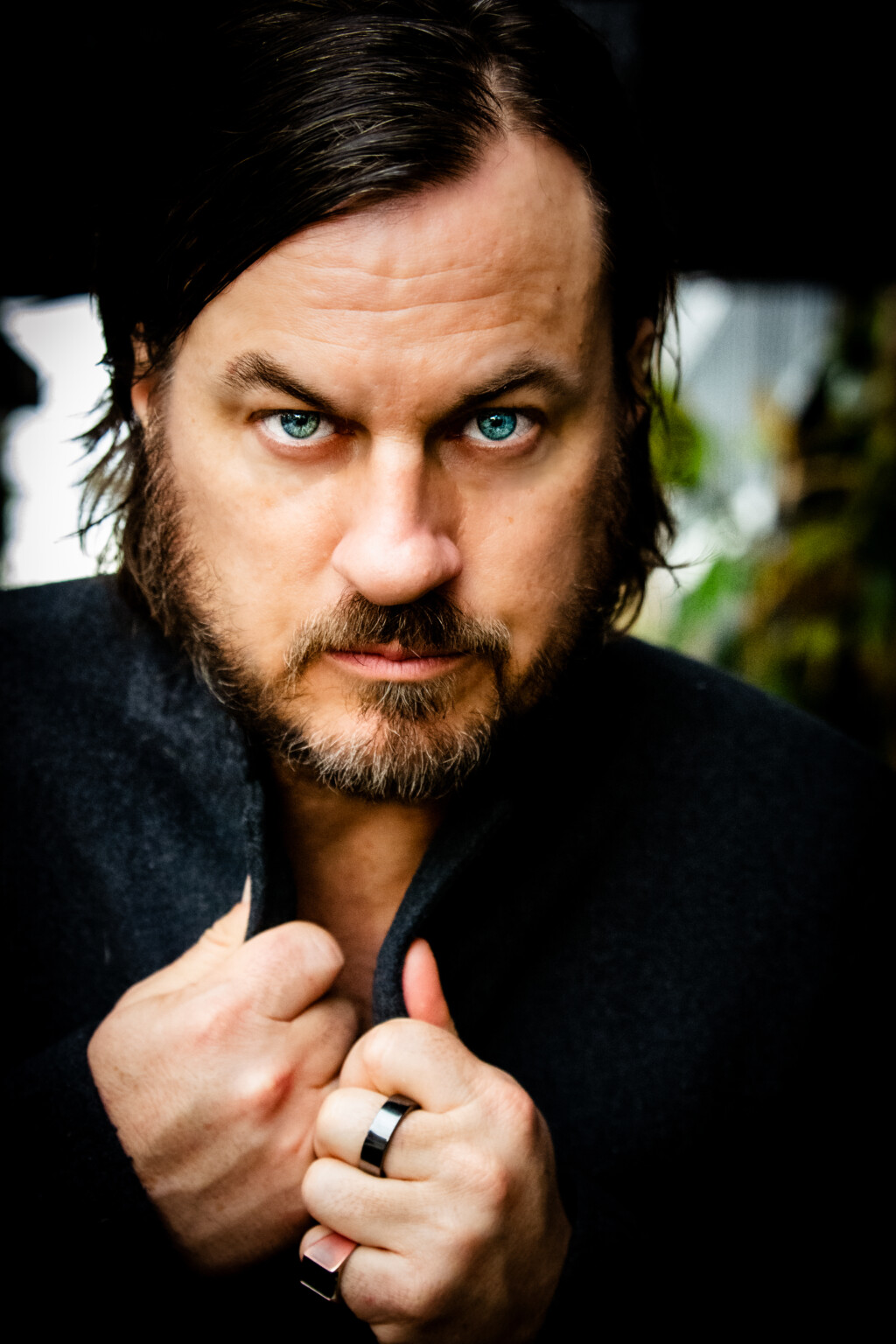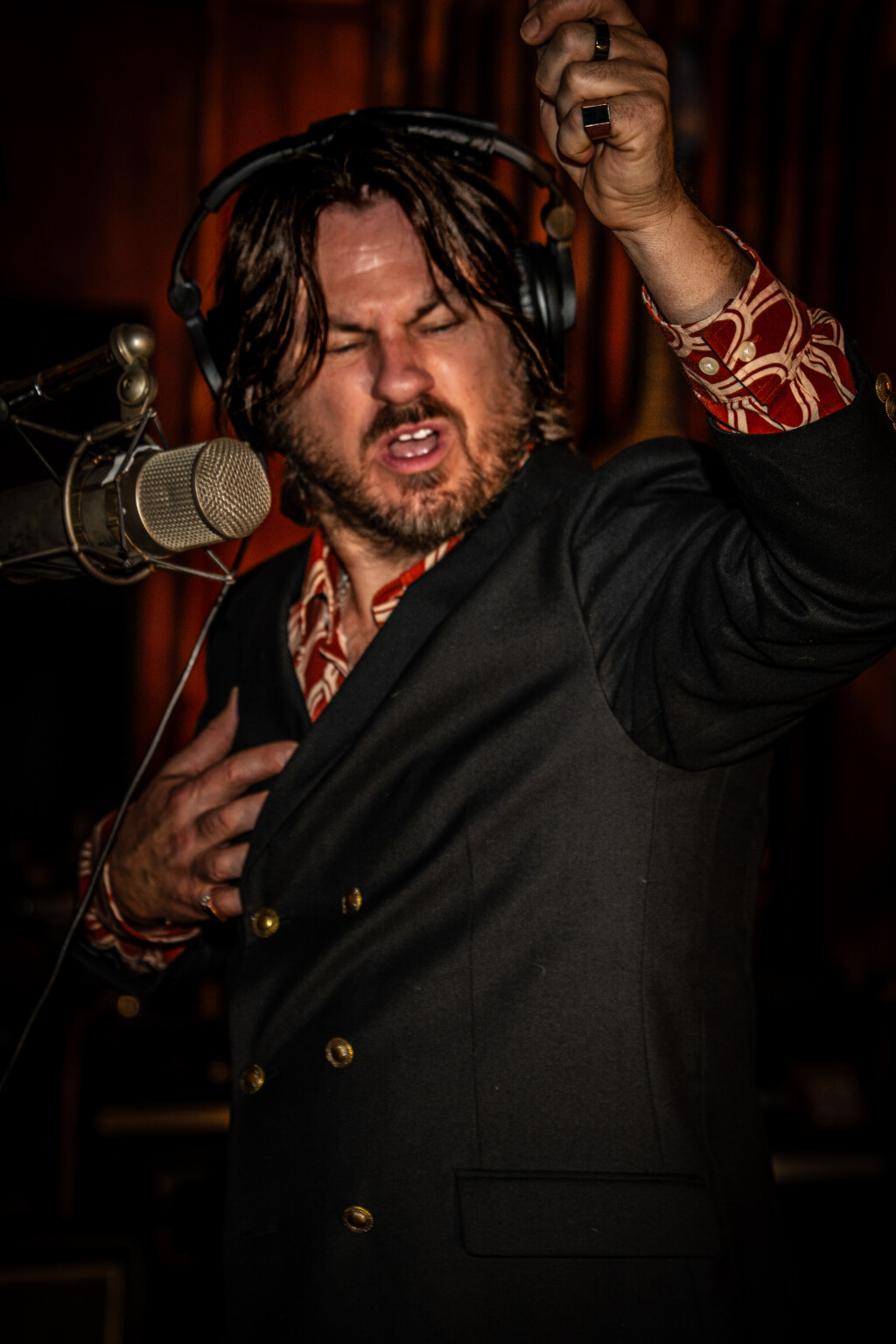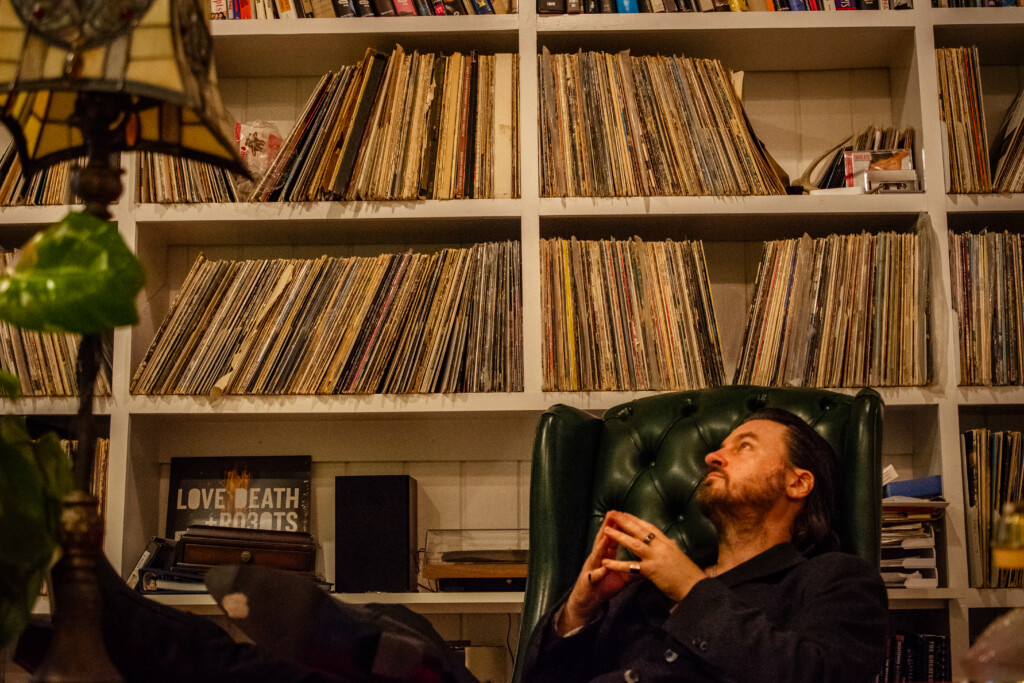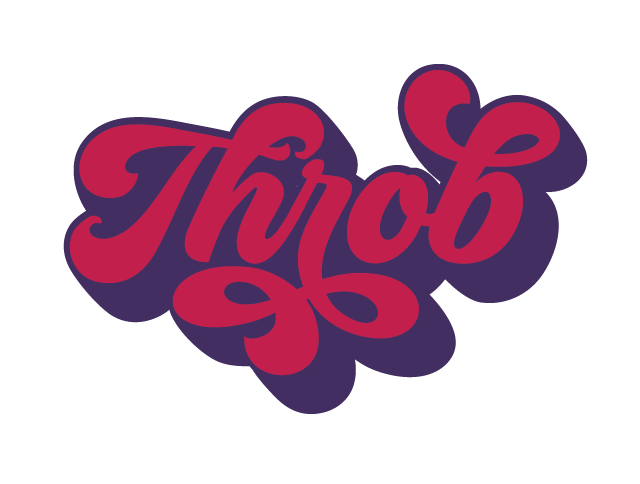Jason Hill gives good interview. Before we met for the first time, I was familiar with his impressive resume – composer, producer, artist, songwriter; the man is a powerhouse of creativity. The thing is, a list of accomplishments doesn’t capture the way his eyes crinkle when he laughs or the way his voice drops to a conspiratorial whisper as he shares stories that would make the most hardened rock star blush. The musical polymath’s conversational style is as engaging as his music – charismatic, mischievous, and brimming with a delightfully unpredictable energy. He’s the kind of man who makes you want to lean in a little closer, eager to catch every unexpected turn of phrase.
From the days of Louis XIV, the band that set the Sunset Strip ablaze in the early aughts, to his current incarnation as one of the most sought-after composers for film and television, Hill’s career is a master class in artistic reinvention. His musical DNA is a complex helix, intertwining strands of glam rock, alternative, and experimental sounds. “I like to be more of a chameleon,” he muses, and suddenly, I’m wondering just how many colors this chameleon can turn.
It all began with a band and a dream. In the early 2000s, Jason Hill and Louis XIV exploded onto the scene, their music a heady mix of rock ‘n’ roll swagger and glam-infused theatricality. Whether it was their electrifying live shows or their provocative lyrics, Louis XIV was impossible to ignore. The band quickly amassed a devoted fanbase, drawn to their rebellious spirit and unapologetic embrace of excess.
After Louis XIV’s reign, he co-founded Vicky Cryer, a supergroup that read like a who’s who of alt-rock royalty, featuring members of The Killer, Muse, and Jamiroquai. This all-star cast of musicians came together to create a sound that was both fresh and familiar, blending their diverse influences into a cohesive whole. The band’s music showcased Hill’s versatility as an artist and his innate ability to adapt across genres, marking a departure from the glam rock stylings of Louis XIV. He even joined the fabled rock band New York Dolls, not only as their bassist for several tours but also as the producer of their final album, Dancing Backwards in High Heels. This collaboration allowed Hill to work closely with one of his musical heroes, David Johansen, and leave his mark on the band’s storied legacy.


All these musical incarnations eventually caught the ear of Ceán Chaffin, David Fincher’s wife and longtime producing partner. Fincher, the acclaimed director known for his meticulous visual style and dark, atmospheric thrillers like Se7en, Fight Club, and The Social Network, has garnered multiple Academy Award nominations for Best Director. ” Ceán said that she would play my stuff all the time in her office, and David kept sticking his head in to ask who she was listening to'” recalls Hill. “It was always, ‘Oh, it’s that same guy.’ Fincher recognized in Hill a rare talent—someone who could meet his exacting standards while injecting a fresh perspective into his projects.
This serendipitous connection would soon lead to a collaboration between the director and the composer that would redefine the trajectory of Hill’s career. Fincher was impressed by Hill’s creativity and saw in him a kindred spirit—an artist unafraid to push boundaries and swim in uncharted waters. Ever the iconoclast, he asked Hill to score the theatrical trailer and teaser for the 2014 thriller Gone Girl.
“He wanted a cover of the 1974 French song “She” by Charles Aznavour for the trailer. Elvis Costello had done a cover of it, where he went really heavy on the love sentiment on it. Fincher saw the song much darker and more twisted,” explains Hill. “She” is sort of like “Every Breath You Take” by The Police. You could look at it as this beautiful love song about a woman he’s in love with, or you could look at it like this psycho is stalking her. David wanted “She” to be like the latter. He saw the two leads in Gone Girl as two of the worst people ever, and they’re perfect together because they’re both such awful humans.”
“I put everything I had into that production. I worked out of Phil Spektor’s old room, Studio 3, at East West for a month. I got a choir and an orchestra. I got David Campbell to conduct the orchestra. It was amazing and really exciting to do.” The result was a lush orchestral and choral arrangement that perfectly captured the dark, twisted undertones Fincher wanted for the trailer. With vocals by Richard Butler of The Psychedelic Furs, the reimagined “She” was a masterpiece.
The Gone Girl trailer marked the inception of a dynamic partnership between Jason Hill and David Fincher, one that would lead to the composer’s innovative work on the Netflix series Mindhunter. “Mindhunter was a great vehicle to let me expand creatively because it really let me embrace the darkness,” he explains. “Musically, I like to swim in those darker places. They’re just more fun.” The psychological thriller series, which probes the minds of serial killers, offered the ideal canvas for Hill to shape unsettling soundscapes and push the envelope of his composition.
Fincher gave Hill an incredible amount of creative freedom and time to craft the show’s distinctive sonic identity. The composer dedicated eight months to working on the score before seeing a single frame of footage. “It was a fantastic opportunity,” Hill admits. “I had all that time to experiment and build a comprehensive library. Fincher’s smart approach of avoiding temp music meant that every piece was an original thought.”
Jason Hill’s score for Mindhunter has been hailed as a game-changer, setting a new standard for the crime thriller genre. “I hear echoes of Mindhunter’s sound everywhere now,” Hill notes. “It’s become a bit of a blueprint for the genre.” His approach, blending atmospheric tension with evocative melodies, has set a new benchmark that others in the field strive to emulate.
Yet, Hill’s seminal work with David Fincher is only a chapter in his storied musical career. Not long after our initial interview, I visited Jason at his legendary studio, The Department of Recording and Power, where so much of his creative vision has taken shape. Stepping through its doors felt like entering a time capsule of musical history. Originally built in the mid-1970s, the studio’s walls have witnessed the birth of countless hit recordings. From James Brown’s soulful funk to Michael Jackson’s pop perfection, the studio has played host to an eclectic array of iconic artists.
In 2015, Jason took the reins of the studio, ushering in a new era of creativity. Under his meticulous guidance, the space underwent a transformative redesign, blending modern upgrades with its vintage charm. Since then, The Department of Recording and Power has become a magnet for A-list talent, attracting the likes of director David Fincher and rock luminaries such as The Killers and Wolfmother.
Jason introduces me to one of his most intriguing creations—The Instrument Machine, or TIM for short. This towering 10-foot-tall amalgamation of bass strings, cello strings, violin strings, and large metal cones has become an integral part of Hill’s scoring process. Witnessing TIM in person is a surreal experience. As he demonstrates his invention’s capabilities, coaxing otherworldly sounds from its strings, I’m struck by the innovation of his vision.
The genesis of TIM is a tale that blends serendipity, creativity, and a touch of madness. It all began when Hill, in his early 20s, received a call from a friend working as a janitor at UCSD in San Diego. “He said they were throwing away this solid steel equipment rack for holding pieces of gear. The modern ones are made really junky, nothing like this thing. This thing was like a tank, probably built in the 50s or 60s.”
Intrigued, Hill threw the rack in his truck, and then it languished for months, taking up space in his studio. Twice, he put it out on the street, hoping someone would take it off his hands, but each time, he found himself unable to let it go. After the second abandoned attempt to give it away, he gave himself an ultimatum: find a purpose for the rack by 7 pm that night, or it’s gone.
“I brought it back in, and I really started looking at it. It had these holes already drilled into it, and I was like, I wonder if I put a string here. I started envisioning something like a harp, but a really gothic devil harp,” he says. “I put some bass strings and part of a guitar on it. I put cello and violin strings above the body. That’s how it got started.”
With TIM’s tones still ringing in my ears, Jason surprises me with a sneak preview of the solo EP he’ll be releasing later this year. As the songs wash over me, I’m again reminded of his uncanny ability to push the limits of what’s possible in music. Each track has its own distinct flavor, yet all are unmistakably Jason Hill. “I don’t like to be put in a box,” he says when asked about the variation in style and tone. “In this business, people really like to put you in boxes, and to them, I’m the rock and roll guy or the dark, true crime guy. I’m always trying to transcend those boxes and explore new creative territory.”

Another testament to his aversion to categorization is the score for the unreleased film Magazine Dreams. It marks a stark departure from his signature style, featuring elegant flutes, clarinets, and strings. “The score is so great and so different from everything else I’ve done,” he explains. “It’s beautiful and delicate. The music is almost classical, and I purposefully wrote it more traditionally. Jonathan Majors plays this emotionally and intellectually stunted guy working out in a dirty garage while dreaming about being on the cover of a bodybuilding magazine. I wanted the music to be juxtaposed to that, to have a certain dignity and sophistication. This is one of my favorite scores I’ve ever done.”
Unfortunately, Magazine Dreams may never see the light of day due to star Jonathan Majors’ legal troubles, a heartbreaking twist for the composer. Hill sees the film’s uncertain future as a missed opportunity for all involved. “It’s really unfortunate because Elijah Bynum is this incredible new director, and Jonathan gave a stellar performance,” he laments. “It could have been a real great vehicle for everybody.”
The uncertain future of Magazine Dreams does little to slow Jason Hill’s artistic momentum, as the prolific composer is currently involved with multiple high-profile projects. Hill crafted the evocative score for Apple TV+’s “Dark Matter,” which debuted on May 8th. The album, comprising 19 tracks, vividly captures his distinctive style – blending atmospheric soundscapes with intricate compositions. Hill also lent his compositional talents to Amazon Prime Video’s horror anthology “Them: The Scare” season 2, which premiered April 25th. Set in 1991 Los Angeles, the series benefits from Hill’s ability to heighten tension through haunting musical landscapes.On May 31st, he unveiled his latest musical contributions as the composer for season 4 of Showtime’s acclaimed documentary series “Couples Therapy”. Hill has provided the scores for the previous three seasons, and his music is integral to capturing the emotional journeys portrayed.
Looking ahead, Hill has an impressive slate of new works on the horizon. In addition to the solo EP coming out later this year, Hill is serving as a music producer on the highly-anticipated Robbie Williams biopic “Better Man”, which is expected to offer an intimate look into the life and career of the iconic British pop star. The film, directed by Michael Gracey (The Greatest Showman), promises to put a unique spin on the traditional biopic format, though details remain tightly under wraps.
With every project he undertakes, Jason Hill redefines music, weaving together diverse genres and unexpected sounds to create a symphony that is uniquely his own. His work on projects like the Mindhunter score and Gone Girl exemplifies his inventive approach and originality. However, perhaps the most captivating aspect of Hill is the man himself. He is a storyteller, a truth-seeker, and a master of reinvention, constantly craving new creative conquests. Jason Hill is a reminder that true artistry knows no limits and that the pursuit of creative expression is a lifelong adventure.
All photographs courtesty of Kandece Brown Photography
Connect with Jason:
- Instagram: @jasonhillofficial
- Website: Jason Hill Music
- Spotify: Jason Hill


